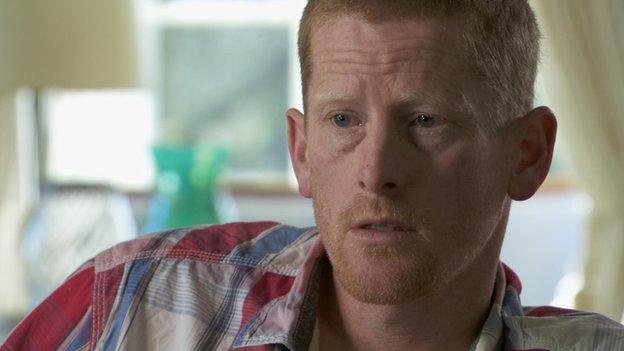Sinn Féin resilient despite new IRA sex abuse allegations
- Published
- comments

County Louth man Paudie McGahon told the BBC's Spotlight programme that an IRA man abused him and then threatened him to remain silent.
A BBC Spotlight programme has again exposed the underbelly of republicanism, and what Gerry Adams himself describes as the "inadequate and inappropriate" way the IRA dealt with allegations of sexual abuse in the past.
Taoiseach Enda Kenny was more colourful, calling the treatment of County Louth man Paudie McGahon an intolerable "kangaroo court".
The carefully considered on-air interviews with Gerry Adams and Raymond McCartney on the distressing case of Mr McGahon were undermined by a tweet from Francie Molloy.
The Mid Ulster MP described the Spotlight programme as "another load of rubbish".
Mr Molloy's subsequent apology and deletion of his tweet doesn't expunge the impression that many republicans would prefer it if victims like Paudie McGahon and Mairia Cahill had obeyed the IRA's initial orders by maintaining their silence.
Expect more discussion about the development of some kind of north-south process to examine the cover-up of abuse during the Troubles and the movement of abusers across the border or across the Irish Sea.
Fianna Fail's Micheál Martin wants "a cross-border mechanism to at least facilitate other victims to come forward, who might not want to go public".
Rather than being the party in the dock, Sinn Féin has tried to seize the initiative by advocating an "all-island process to deal with the issue of providing support mechanisms for all those who were victims of sexual abuse during the conflict".
Micheál Martin is dismissive of the Sinn Féin suggestion, arguing in the Dáil (Irish parliament) that it had been developed by republicans "just to dilute your culpability".
Northern Ireland's Justice Minister David Ford and his Irish counterpart Frances Fitzgerald are wary of sanctioning any process that might cut across investigations or reviews already under way involving the Garda (Irish police), the Police Ombudsman or the former DPP, Keir Starmer.
Mr Kenny is prepared to work with the first and deputy first ministers to consider a process related to the cross-border abuse allegations, however he emphasises that such a process "has to be independent of the court proceedings".
Whilst we await an outcome to these somewhat convoluted discussions, the public north and south will no doubt make up their own minds about cases like those of Paudie McGahon and Mairia Cahill and their handling by both the IRA and the Sinn Féin leadership.
Although no party would welcome such adverse publicity, Sinn Féin can take heart from their poll ratings in the key battleground in the Irish Republic.
Skeletons rattling
Recent Irish opinion polls have placed the party on anything between 20% and 24%, fighting it out with Enda Kenny's Fine Gael for top spot.
When Mr Adams declared at his ard fheis (party conference) last weekend that Sinn Féin wanted to lead the next Irish government, those poll ratings dictated that his ambition should be taken seriously.
If more conventional politicians had to deal with the kind of skeletons rattling around Sinn Féin and the IRA's cupboards, they would be expected to implode.
But Mr Adams and Martin McGuinness have many years' experience of standing their ground against all comers.
Perhaps a drip drip of further revelations will eventually dent Sinn Féin's appeal, but right now it is striking how resilient the party is proving to be.